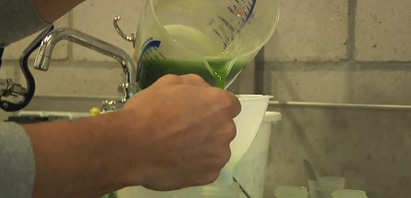Bio based chemicals are the unexpected beneficiaries of the North American shale gas boom, says a special report from IHS Inc., a leading global source of critical information and insight.
Sugars, glycerin and other plant-derived feedstocks are emerging as economically competitive starting materials for a range of commodity chemicals, in part, the report says, because of tight supplies of conventional feedstocks such as propylene, isobutylene, butadiene and isoprene.
The shortfall is due to the shale gas boom: North American ethylene producers have switched from petroleum-derived naphtha to lighter, natural gas-based feedstocks, reducing the output of valuable C3, C4, C5 and pygas co-products. These co-products, in turn, are the starting materials for a variety of chemical intermediates and polymers. Examples include synthetic rubber, an essential material for tire production, as well as nylon 6.6, used for fiber production and automotive parts, according to the IHS Chemical Special Report: Chemical Building Blocks from Renewables.
Production capacity for bio based chemicals is significant
“Production capacity for renewable chemicals is significant, even though it accounts for a small share of overall chemical production capacity,” said Marifaith Hackett, director of specialty chemicals at IHS Chemical and the report’s lead author. “In 2013, total annual production capacity for renewably sourced chemicals was approximately 113 million metric tons (MMT), including nearly 89 MMT of ethanol capacity.”
Of the bio based chemicals now in commercial production (excluding ethanol), fatty acids accounted for 46 percent of total global bio based chemical production capacity in 2013, followed by sorbitol at approximately 16 percent; glycerin at 14 percent, and fatty alcohols production at 11 percent. Lactic acid, furfural and several other small-volume chemicals rounded out the bio based production capacity for 2013.
Even today, for some products economics favor the bio based route
Of course, Hackett noted, capacity share varies by chemical. In some cases, bio based chemicals account for a sliver of total (bio based plus fossil-fuel-based) production capacity; in other cases, the most widely used production routes rely on renewable feedstocks. Bio based ethylene, for example, accounts for a minuscule share of total production capacity. In contrast, the bulk of glycerin and fatty acid production depends on renewable feedstocks. In the case of glycerin and fatty acids, economics favor the bio based route over the fossil fuel–based route.
“As the process technologies for these chemicals evolve, the gap between bio based and fossil-fuel based production costs is shrinking,” Hackett said “The key is that, increasingly, processes based on renewable starting materials provide a critical alternative source of “on-purpose” production for certain chemicals that are in short supply—like butadiene. Tire and rubber producers, in particular, want to ensure stable long-term supplies of the key chemical precursors for their products, and bio based chemicals have the potential to address that need along with offering greater price stability.”
In addition to supply chain considerations, Hackett said, consumer demand and corporate sustainability initiatives are driving the increased use of bio based chemicals. Employing bio based chemicals helps manufacturers respond to consumer demand for more sustainable products, and it supports the manufacturer’s efforts to reduce its carbon footprint. Bio based chemicals usually have lower cradle-to-gate greenhouse gas emissions than their fossil-fuel-based counterparts.
“Nonetheless,” Hackett noted, “economics has a significant impact on demand. Cost and performance considerations continue to outweigh sustainability in most corporate purchasing decisions. Some manufacturers are willing to pay a premium for the sustainability benefits and customer appeal, but performance of these renewable chemicals has to equal that of their fossil-fuel based equivalents.”
Value chain for the bio based chemicals sector differs
Since these bio based chemicals are derived from agricultural products, the value chain for the bio based chemicals sector differs significantly from that of the chemical industry, Hackett said. She added that nontraditional players – notably industrial biotechnology firms and start-up companies with focused expertise in chemical catalysis – are emerging as chemical producers. In many cases, she said, these companies are partnering with established agricultural processors and chemical manufacturers to gain access to capital, fermentation or chemical processing expertise, proprietary technology, or feedstocks.
Natural fats and oils have, for many years, served as feedstocks for fatty acids and fatty alcohols; starches and sugars are well established starting materials for ethanol, lactic acid and sorbitol. More recently, plant-derived feedstocks have emerged as economically viable starting materials for commodity chemicals such as butanediol, isoprene and para-xylene, as well as for novel chemicals such as 2,5-furandicarboxylic acid and isosorbide.
Archer Daniels Midland is producing propylene glycol from glycerin, a co-product of biodiesel production. BASF, a licensee of Genomatica’s technology, is supplying bio based 1,4-butanediol, a spandex precursor. Agricultural processor Cargill Inc., a producer of sorbitol and lactic acid, is developing routes to bio based acrylic acid with Novozymes and BASF.
DuPont Tate & Lyle Bio Products, a joint venture of chemical producer DuPont and food ingredient supplier Tate & Lyle, is now producing bio based 1,3-propanediol, a starting material for fibers and engineering plastics as well as an ingredient in personal care products. Solvay, Jiangsu Yangnong Chemical and Vinythai Public Co. Ltd. are producing bio based epichlorohydrin from glycerin. Gevo Inc. produces bio based isobutanol on a commercial scale and bio based para-xylene (a precursor of polyethylene terephthalate (PET)-bottle resin) on a pilot scale. Laihe Rockley Biochemicals produces bio based butanol and acetone from agricultural waste (corn stover and corn cobs).
Although not yet at commercial-scale production, several tire manufacturers have formed alliances to produce bio based synthetic rubber from bio based isoprene or bio-based butadiene.
Source: Biomass Magazine
